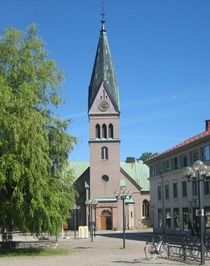Born into nobility, Helen lived a quiet and entitled upbringing. Married as a young woman, she married and bore several children, but was sadly widowed a very young age. Following the death of her husband, Helen devoted herself to caring for her family and maintaining the family farm. Diligent and hard-working, the family thrived. However, she soon began to feel called to help those who were less well-of, and gradually began distributing her wealth and possessions to the poor.
Dedicated to the Lord, she financed the construction of the church in Skövde, and subsequently departed Sweden for a pilgrimage to the Holy Land. In Jerusalem, she grew closer to God, and returned to Skövde to her farm where she dwelt in charitable acts, quiet contemplation, and prayer.
Prior to her departure on pilgrimage, Helen’s now-adult daughter married an unkind and abusive man, who frequently beat her and was mercilessly unkind. While Helen was away, visiting the Church of the Holy Sepulcher in Jerusalem, the servants of the household conspired to murder the abusive man. Upon her return, her daughter’s in-laws blamed her, and hoping to avenge the death of their son, killed Helen on the way to church at Götene.
 |
| Church of Saint Helen |
Over time, Saint Helen’s grave became a pilgrimage site. Traditionally, pilgrims would take home small bags of dirt from St. Helen’s grave (they wore the bags around their necks) for their healing properties.
Saint Helen demonstrated, throughout her life, and openness to the call of the Lord. Not content to relax in her nobility and privilege, she distributed all she had to those in need, espousing the charitable acts of Jesus. Drawn to the Holy Land, she opened herself to the call of God, leading her deeper into the sacred relationship with the Divine. We pray today for the same courage to open ourselves to the call of the Lord, certain in the wonders and gifts that await us.
Year 2: Day 212 of 365
Prayer Intentions: Charity and love; the courage to follow our hearts toward the Lord.
Requested Intentions: For a family’s intentions (T); Successful examination results (B); Healing of a friend with cancer, for all those who help others (B); Healing and love (L); Grace and healing (V); Healing of a heart, consecration of a marriage (M); Health of a family, intentions of apostolate (H); For repentance (J); For a family in trouble (R); Healing, successful relationships for son, financial success (J); Success of a company (L); For a religious society (J); Healing of a husband, strength as a faithful caregiver (D); Healing of a son (T); Financial security, Healing and guidance (M); Healing of a heart and relationship (V); Employment for daughter (J); For a marriage that glorifies the Lord (K); Resolution of family situation, parents’ health (A); Positive results (C); For a son’s employment, faith, and relationships (S); Restored family relationships (A); Healthy conception and delivery of children (J); For a girlfriend’s recovery from a debilitating mental illness (J); For a daughter’s successful examination results (A); Occupational success, health and safety of family (S).












